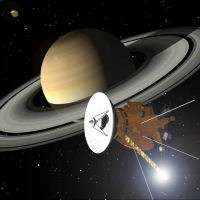Cassini Scientist for a Day Competition: International edition 2010
1 September 2010
The 2010 edition of the 'Cassini Scientist for a Day' competition is open to students from around the world. The competition is designed to give the participants a taste of life as a scientist. Students are invited to submit a 500-word essay explaining their choice of one of three targets to be imaged by Cassini.Be a Cassini Scientist for a day
 |
School students from participating countries must choose one of three targets that Cassini will image and write an essay to justify their choice to a panel of experts. Essays must be submitted to the appropriate national organiser who will select the winners for that nation. Note that closing dates, competition rules and age categories may vary from country to country.
Complete competition rules, including details of participating countries, are provided on the NASA Jet Propulsion Laboratory (JPL) website (see the link in the right-hand menu).
Winners of the competition will have the opportunity to have their questions about Saturn and the Cassini mission answered by Cassini scientists.
The first international edition of the competition took place in the International Year of Astronomy 2009; the winners of that edition are listed on the 'Cassini Scientist for a Day' competition website.
Cassini-Huygens Mission
The Cassini-Huygens mission is an international endeavour between NASA, ESA and the Italian Space Agency (ASI). In 2004, after a journey of nearly seven years the spacecraft, made up of NASA's Cassini orbiter and ESA's Huygens probe, was the first to enter orbit around Saturn.
In January 2005, the Huygens probe touched down on the surface of Titan, one of Saturn's moons. This is the only landing to take place in the outer Solar System and the furthest from Earth.
The Cassini spacecraft is currently in orbit around Saturn providing scientists with an abundance of information about the giant planet and its moons.
A strong European interest in Cassini-Huygens
The Huygens probe was developed by ESA and many European countries were involved in the development of the 12 instruments on-board the Cassini orbiter.
Data returned to Earth by the Huygens probe, along with data from the ongoing Cassini mission, are studied by hundreds of scientists from around the world. Many of the scientists participating in this international mission of exploration and discovery are European.
